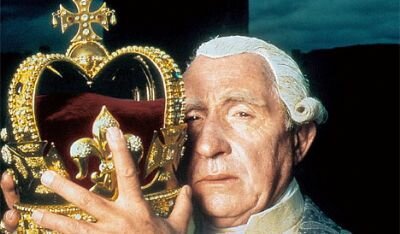
|
| |
|
|
| |
Directed by: Nicholas Hytner 
Written by: Alan Bennett  (LONDON CRITICS' CIRCLE AWARD - BRITISH SCREENWRITER OF THE YEAR, AAN), from his own play The Madness of George III (LONDON CRITICS' CIRCLE AWARD - BRITISH SCREENWRITER OF THE YEAR, AAN), from his own play The Madness of George III
|
|
| |
|
|
| Tookey's Review |
|
| Pro Reviews |
|
| Mixed Reviews |
|
| Anti Reviews |
|
| Cast |
|
| |
 |
| |
| Released: |
1995 |
| |
|
| Genre: |
DRAMA
COSTUME
BIOPIC
|
| |
|
| Origin: |
GB |
| |
|
| Length: |
110 |
|
| |
|
| |
|
|
| |
|
|
The year is 1788. America has declared independence. French revolution is in the air. King George III's new equerry (Rupert Graves) watches appalled as the King (Nigel Hawthorne, pictured) goes off his crowned head, and the royal doctors only make matters worse. As the King descends into dementia, England plunges into political crisis, with Prime Minister Pitt (Julian Wadham) taking the King's side and opposition leader Fox (Jim Carter) favouring the Prince of Wales (Rupert Everett). When the Prince cruelly tries to hasten his father's decline by forbidding visits from his wife (Helen Mirren), the Queen's lady-in-waiting (Amanda Donohoe) recalls a doctor (Ian Holm) who may have the answer to the problems of both King and Country.
|
Reviewed by Chris Tookey
|
Thanks to Nicholas Hytner's lively direction and a magnificent cast, this is the most entertaining big-screen transposition of a history play since A Man For All Seasons.
There are, of course, Shakespearean echoes in this tale of a King whose own offspring want him off the throne. Alan Bennett has re-written King Lear, but with a feelgood ending - an unrealistically happy conclusion, since the film ends with a recovery which proved to be only temporary. George III suffered further serious relapses and spent the last ten years of his reign blind and insane.
Bennett takes dramatic licence, too, in the loveliest moment of the film - when King George reads aloud the recognition scene from King Lear, and recognizes himself in Shakespeare's tragic hero ( "I fear I am not in my perfect mind"). The real relationship between Shakespeare and sovereign was less cosy - when George's madness returned, performances of the full text of King Lear were banned until the King's death in 1820.
But Bennett's familiar strengths are on display - especially his wit, and sympathy for old people. Nigel Hawthorne here gets to play a masculine, upmarket version of all those formidable old biddies usually played in Alan Bennett plays by Thora Hird.
This is very much a film for today. Modern parallels are never far away, as when the heir to the throne complains "To be Prince of Wales is not a position, it is a predicament".
Bennett points a moral for present royals - that the monarchy is essentially a job which requires theatrical self-discipline. "Smile and wave! It's what you're paid for!" Queen Charlotte instructs the bored Prince of Wales.
But Bennett sees that this theatricality must have tragic, dehumanising effects. As one of King George's doctors remarks, "The state of monarchy and the state of lunacy have a common frontier... Who can flourish on such a daily diet of compliance?" None of the royal characters comes through psychologically unscathed.
Many who see this film will find themselves sympathising with the republican sentiments of Charles Fox: "God rot all royals - give us the wisdom of America!" Yet Bennett draws no such firm conclusion himself, and shows respect for the pomp and pageantry. The royals do, after all, put on a terrific show - and bind the nation together more effectively than any mere politician.
Bennett also portrays with rare sensitivity the long, loving marriage between the King and his German wife Charlotte (Helen Mirren). Mirren's accent comes and goes, and she never looks as if she has borne five children, let alone fifteen; but the tenderness between "Mr and Mrs King", as they call each other, is very moving.
Bennett's screenplay is so clever and multi-layered that its occasional defects - moments of clumsy exposition, a lack of clarity about how royal patronage worked, the lack of a European dimension, and a denouement which is triggered mainly by chance - hardly detract from its entertainment value.
Ian Holm does a memorable turn as the only doctor willing - or mad enough - to stand up to the royal temperament. Rupert Everett is an amusingly foppish villain. Composer George Fenton makes splendid use of Handel's music, so that the score sounds as sumptuous as Mark Thompson's costumes look.
But the film belongs to Nigel Hawthorne. He may not win the Oscar for Best Actor next Monday night, but he deserves to. This is one of the great screen performances - all the more creditable, since Hawthorne played the role on stage yet still resists the temptation to ham it up. Sir Ralph Richardson could not have done better.
It is a difficult task to make a modern movie audience empathise with an old snob, hovering between eccentricity and madness. But Hawthorne does it, and by the end we're all hoping for this oddly lovable human to win through. After all, fear of madness is a universal anxiety - not merely a royal, or eighteenth century one.
|
|
|
|
|
|
